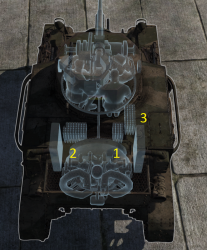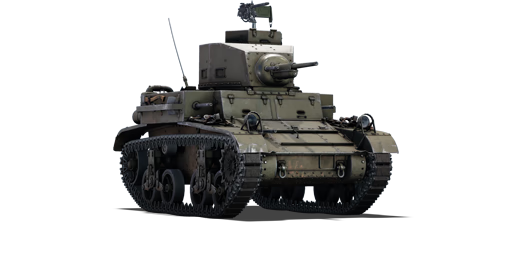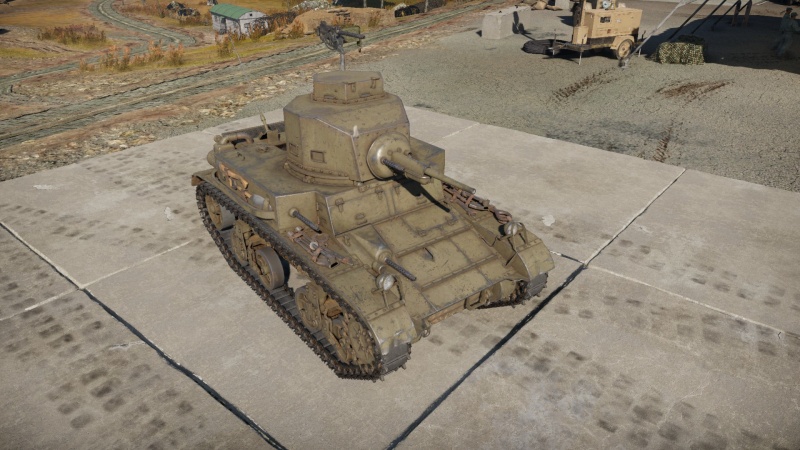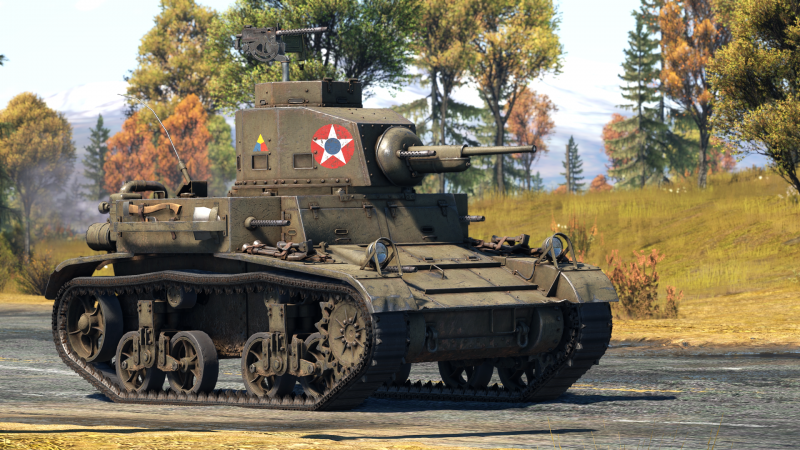Difference between revisions of "M2A4"
(→Description) |
U153435799 (talk | contribs) (→Pros and cons) (Tag: Visual edit) |
||
| Line 155: | Line 155: | ||
* Acceptable gun | * Acceptable gun | ||
* Fair armour all around | * Fair armour all around | ||
| − | * Machine | + | * The high amount of Machine guns allows for flexibility in taking out exposed SPAA and tank destroyers |
* Roof-mounted .30 calibre is quite effective at taking out unarmoured aircraft | * Roof-mounted .30 calibre is quite effective at taking out unarmoured aircraft | ||
Revision as of 11:57, 19 October 2023
| This page is about the American light tank M2A4. For the premium version, see M2A4 (1st Arm.Div.). |
Contents
Description
The M2A4 was the fourth variant of the M2 light tank family (formally Light Tank, M2) that served in the U.S. Army during the interwar period. This ultimately led to the development of the M3 Stuart family of light tanks later in World War II. The U.S. observations of the Spanish Civil War raised concern that their tank fleet, which consisted primarily of machine gun-armed M2A2 light tanks, was inadequate for the type of armoured warfare expected to occur in the future conflict. Initial recommendations included improving the armour thickness of their tanks and also introducing a 37 mm anti-tank gun. The first step towards implementing these modifications came on December 29, 1938, when it was ordered that a production M2A3 be modified into M2A4 light tank specifications for trial. After a series of U.S. Army trials and additional changes, the M2A4 was approved for production in May 1940, which would run until April 1942 with 375 tanks built. The M2A4 was the U.S. military's primary light tank when World War II started and would see service with the U.S. Marines in the Battle for Guadalcanal. The M2A4 would be replaced in production and usage by the M3 Stuart, which would achieve more combat fame in the European Theatre.
Introduced in Update 1.45 "Steel Generals" alongside the initial American ground tree, the M2A4 is a reserve light tank available for new players. The M2A4 light tank gives a good view into the M3 Stuart family of light tanks available for future research, presenting a fast and nimble vehicle with a respectable 37 mm anti-tank gun, though having subpar protection against close-range shots. While the M2A4 may not exceed in traits when coming up against its peers, these characteristics allow the M2A4 to perform flexibly, whether coming into a direct encounter with an enemy tank or outmanoeuvring the enemy to hit them in their weak spots with the 37 mm gun without being spotted.
General info
Survivability and armour
Armour type:
- Rolled homogeneous armour
- Cast homogeneous armour (Gun mantlet)
| Armour | Front (Slope angle) | Sides | Rear | Roof |
|---|---|---|---|---|
| Hull | 25.4 mm (19°) Front plate 15.8 mm (69°) Front Glacis 25.4 mm (20°) Lower glacis |
25.4 mm | 25.4 mm Top 25.4 mm (18°) Bottom |
6.35 mm |
| Turret | 25.4 mm (11°) Turret front 25.4 mm (12-65°) Gun mantlet |
25.4 mm | 25.4 mm | 6.35 mm |
| Cupola | 25.4 mm | 25.4 mm | 25.4 mm | 6.35 mm |
Notes:
- Suspension wheels are 15 mm thick, tracks are 10 mm thick.
Mobility
The overall mobility is decent. The top speed is great, easily getting to around 50 km/h on solid roads which is faster than most of the reserve tanks like Pz.II, T-26. However, wheeled vehicles like the Sd.Kfz. 140/1 can easily outrun the M2A4 on road. On softer roads like grassland and sand, it remains around 30 km/h which is still quite fast.
The hull traverse brings the overall mobility down quite a bit, since when the tank is still it turns very sluggishly, especially on soft terrain. The hull traverse gets faster when the tank is moving, but in full speed, it starts to snake around like a wheeled vehicle which makes it hard to control. Thus you must get used to this handling.
The reverse speed is only adequate to dodge shots from a distance. Do not expect to quickly reverse back to cover like a Puma.
| Game Mode | Max Speed (km/h) | Weight (tons) | Engine power (horsepower) | Power-to-weight ratio (hp/ton) | |||
|---|---|---|---|---|---|---|---|
| Forward | Reverse | Stock | Upgraded | Stock | Upgraded | ||
| Arcade | Expression error: Unexpected * operator. | 406 | Expression error: Unexpected round operator. | __.__ | |||
| Realistic | 232 | Expression error: Unexpected round operator. | __.__ | ||||
Modifications and economy
Armaments
Main armament
The overall firepower is decent for the reserve battle rating. The main cannon has an adequate penetration of about 60 mm which is more than enough to go through most tanks below 2.0, for example, T-26, Pz.III and Pz.35(t). Although the available ammunition rounds are all solid shells, they still create large amounts of shrapnel when penetrating which is enough to knock out compact tanks like T-26 and Pz.35(t) with a single shot. For larger tanks like the LVT(A), accurate shots aimed at the crew's positions are required, which might be a little hard for new players. The cannon has enough accuracy to precisely target a weak spot on an enemy tank within 500 m. If one shot misses, the reload time of around 3.5 seconds allows for quick follow-up shots.
There is a nice stabiliser for the cannon which is a big advantage when exchanging fire, as it allows you to move out of cover and fire (usually before the enemy) without having to wait for your tank to stop wobbling. The stabiliser should be utilised to maximise your chance of surviving and killing. Note that it only works below 10 km/h, so remember to slow down or it will not stabilise the gun.
Targets like the 15cm sIG 33 B Sfl or M3 GMC can be quite hard to destroy, as their armour is thin enough to create little shrapnel, but are also thick enough to stop MG bullets. Against them, you can only rely on you fire rate, accuracy and of course your knowledge of their crew position to knock out their crew members one by one. Always go for the gunners or drivers first, if you failed then they can always fire back at you and disable you.
The main cannon is effective in close-quarter combat (usually within 200 m) or against weakly armoured targets since the penetration drops drastically as the range increases, plus the small calibre makes the shells easy to ricochet. When encountering fairly well armoured tanks like the M13/40 or H.35, try to break their gun barrels first or detrack them. If they are too far away, pin them on the map and call teammates to help.
| 37 mm M5 | Turret rotation speed (°/s) | Reloading rate (seconds) | |||||||||||
|---|---|---|---|---|---|---|---|---|---|---|---|---|---|
| Mode | Capacity | Vertical | Horizontal | Stabilizer | Stock | Upgraded | Full | Expert | Aced | Stock | Full | Expert | Aced |
| Arcade | 103 | -10°/+20° | ±180° | Shoulder | 19.5 | 27.0 | 32.8 | 36.3 | 38.6 | 3.77 | 3.33 | 3.07 | 2.90 |
| Realistic | 12.2 | 14.4 | 17.4 | 19.3 | 20.5 | ||||||||
Ammunition
| Penetration statistics | |||||||
|---|---|---|---|---|---|---|---|
| Ammunition | Type of warhead |
Penetration @ 0° Angle of Attack (mm) | |||||
| 10 m | 100 m | 500 m | 1,000 m | 1,500 m | 2,000 m | ||
| M74 shot | AP | 77 | 74 | 64 | 53 | 44 | 36 |
| M51B1 | APCBC | 86 | 83 | 71 | 59 | 49 | 40 |
| Shell details | ||||||||||||
|---|---|---|---|---|---|---|---|---|---|---|---|---|
| Ammunition | Type of warhead |
Velocity (m/s) |
Projectile mass (kg) |
Fuse delay | Fuse sensitivity (mm) |
Explosive mass (TNT equivalent) (g) |
Ricochet | |||||
| 0% | 50% | 100% | ||||||||||
| M74 shot | AP | 870 | 0.87 | - | - | - | 47° | 60° | 65° | |||
| M51B1 | APCBC | 870 | 0.87 | - | - | - | 48° | 63° | 71° | |||
Ammo racks

| Full ammo |
1st rack empty |
2nd rack empty |
3rd rack empty |
Visual discrepancy |
|---|---|---|---|---|
| 103 | 84 (+19) | 41 (+62) | 1 (+102) | No |
Note:
- Racks disappear after you've fired all shells in the rack.
Machine guns
The machine gun is only powerful enough to destroy poorly protected vehicles such as AS 42, FlakPz I and GAZ-AAA. The penetration of around 10 mm is not enough to go through the frontal armour of those not-so-weakly-armoured tanks like SU-5-1, Panzerjäger 1 or 15cm sIG 33 B Sfl. If you are skilled the two MG can effectively damage low-flying biplanes and help zone out enemy ground attack aircraft.
The fixed machine guns in the hull are of little use most of the times, as it is very hard to point the hull directly at a target with the poor hull traverse of the M2A4.
| 7.62 mm M1919A4 | ||||
|---|---|---|---|---|
| Mount | Capacity (Belt) | Fire rate | Vertical | Horizontal |
| Coaxial | 5,250 (250) | 500 | N/A | N/A |
| Pintle | 3,000 (250) | 500 | -10°/+45° | ±90° |
| Machine gunner | 5,250 (250) | 500 | N/A | N/A |
| Hull (left side) | 5,250 (250) | 500 | N/A | N/A |
| Hull (right side) | 5,250 (250) | 500 | N/A | N/A |
Usage in battles
The M2A4 light tank is the reserve tank for the USA. As such, it is very manoeuvrable and fast, being a light tank. However, it has many distinguishing features that make it a forgiving beginners tank.
The M2A4 is most comparable to a cross between a BT-5 and T-26. The M2 has slightly less mobility than the BT-5 while being a larger target and having better armour, like the T-26. The M2A4 also has a fast-firing 37 mm M5 cannon that can fire M74 or M51 shot, as well as the M61 shell.
Its gun has better accuracy than the majority of tanks on its rank, and it's APC ammo retains its penetration at most ranges. This ability to hit rapidly from range and still penetrate in part makes up for the somewhat anaemic damage of the 37 mm gun.
Like all tanks of this rank, it is lightly armoured and can be damaged or knocked out by any other vehicle from anywhere on the map. A useful tactic is to make use of its speed by engaging at range and then relocating when the fire gets too heavy around you.
Enemies worth noting:
Specific enemy vehicles that bear mentioning are firstly any Germans with the 20 mm KwK/FlaK38 cannon, this gun might be small but can have up to 48 mm of penetration, which is enough to go through the M2A4 almost anywhere. These guns can also fire 10 rounds at 280 rounds/min before having to reload the clip, meaning that they will very easily take out your crew before you have a chance to respond. To counter, the best chance you have is to angle your frontal armour which can make it difficult for the PzGr 40 rounds to penetrate. The Russian T-50 and T-126 are vehicles you will also see commonly, these have fairly thick and angled frontal armour that will prevent you from easily getting through. These tanks can also carry an APHEBC round that will destroy you in one shot with little difficulty, so to counter you should use your speed to attempt to get a side shot into either the turret or engine. If the T-50 cannot move you can outrun its turret and finish it without much difficulty.
Pros and cons
Pros:
- Fast and agile
- Acceptable gun
- Fair armour all around
- The high amount of Machine guns allows for flexibility in taking out exposed SPAA and tank destroyers
- Roof-mounted .30 calibre is quite effective at taking out unarmoured aircraft
Cons:
- Thin armour
- Terrible for hull-down postions due to lack of armour
- Prone to catching fire
- Uneasy handling, prone to slide at high speeds
- Terrible steering, not adequate under 2nd gear
- While fast on flat ground, it has problems with climbing steep hills
- Driving this straight into a wall at a fast speed can result in a crew knock out
- Can struggle to destroy larger vehicles due to lack of explosive filler
History
Development
The M2 Light Tank series was an American pre-World War II design as their answer to a fast, effective tank in a cavalry role.
The idea of light tanks started with the Defense Act of 1920, which defined tanks as an infantry support weapon. However, multiple theorists brought up the idea of a cavalry role for the tanks to which the British were the first to incorporate with the cruiser tanks. Limitation in American development leads to the establishment of light tanks as the combat cars. The development team soon looked at the tank prototypes T1 light tank and the T2 medium tank from which they decided to use them as the basis for the light tank design.
Modifications made onto the experimental tanks including installing the new Vertical Volute Spring Suspension (VVSS) which became the main suspension in future American tank development, made the tanks into the M2A1 light tank. The main version used before the war was designated the M2A2 and had two turrets, both with a .50 calibre M2 Browning machine gun as their armament. However, the Spanish Civil War demonstrated that this kind of light tank was insufficient for the ever-evolving tank warfare. Revising the armament of the tank, the two M2 Browning turrets were removed and replaced with a turret outfitted with a 37 mm cannon and improved armour. This became the M2A4 and served as the main light tank variant in US service prior to World War II.
Combat usage
Although the M2 light tanks were promising in their introduction, they were soon succeeded by the M3 and M5 light tanks. While development projects were in the works for bigger and better tanks, the M2 light tanks was a stopgap solution which filled a dire and immediate need for training crews and fielding tanks on the battlefield. By December 1941, the M2 light tanks were being used for training purposes only with the US Army, however, the US Marine Corps (specifically Company A, 1st Marine Tank Battalion) used a small number in combat during the Battle of Guadalcanal in the Pacific due to the lack of M3 light tanks available.
Britain ordered some M2 light tanks in early 1941 in part of the Lend-Lease Act, but only 36 were delivered before switching to the improved M3 light tanks. They were not used in combat.
A common feature on early US tanks was a large number of machine guns. Aside from the coaxial and the bow gunner's ball mounted gun, two machine guns were fixed facing forward on the sides of the hull, fired by the driver. Yet another M1919 Browning machine gun could be mounted on top of the turret in an anti-aircraft capacity.
| Archive of the in-game description | |
|---|---|
|
The M2 series traced its family tree back to the experimental T2s, with the M2A4 ending up the largest and most successful modification. Development began in 1939 after running trials for light tanks designed for infantry support as well as the M1 series. The M2 infantry tank was used as the base for construction, a model that was to undergo significant modification. The turret armour as well as the front end were thickened to 25 mm, capable of withstanding hits by light cannons and high-calibre machine guns. The tank's weaponry was also improved with the installation of an M5 37 mm cannon paired with a 7.62 mm machine gun in the single turret. Another 7.62 mm machine gun was mounted in the front hull plate, with two more on the sides. An antiaircraft machine gun could be mounted on the top of the turret, and additional viewing slits were cut out of the turret and cupola. Most tanks featured the 360 hp Continental W-670-9A engine, which pushed their top speed to 56 km/h. Several tanks in the series were equipped with Guiberson T1020 diesel engines. Given that September 1939 saw a spike in orders, the Rock Island Arsenal was no longer able to keep up on its own with the demand being placed on it by the US army. A tender for an additional batch was announced and won by American Car & Foundry. In October 1939 a contract for 329 tanks was signed, though it was soon expanded to 365. The last ten were assembled in April 1941 by Baldwin Locomotive Works, meaning that 375 M2A4s were produced in 1940. The tanks only saw action on Guadalcanal and other Pacific islands. A few others were shipped to the UK via Lend-Lease and used there to train M3 medium tank crews. | |
Media
- Skins
- Videos
See also
- Other vehicles of similar configuration and role
External links
- [Vehicle Profile] M2A4 Light Tank
- [Wikipedia] M2 light tank
- [Tanks Encyclopedia] M2 Light Tank
- [Military Factory] M2 (Light Tank, M2)
| Rock Island Arsenal | |
|---|---|
| Tanks | |
| Light Tank | Light Tank M2A2 · Light Tank M2A4 |
| Medium Tank | Medium Tank M2 |
| USA light tanks | |
|---|---|
| LVT | LVT(A)(1) · ○LVT(A)(1) · LVT(A)(4) |
| M2 | M2A2 · M2A4 · M2A4 (1st Arm.Div.) |
| M3/M5 Stuart | M3 Stuart · M3A1 Stuart · M3A1 (USMC) · M5A1 · M5A1 TD · ▃Stuart VI (5th CAD) |
| M22 Locust | M22 |
| M24 Chaffee | M24 · M24 (TL) |
| M18 Hellcat | M18 GMC · M18 "Black Cat" · Super Hellcat |
| M41 Walker Bulldog | M41A1 |
| M551 Sheridan | M551 · M551(76) |
| M3 Bradley | M3 Bradley · M3A3 Bradley |
| Wheeled | M8 LAC · T18E2 · M1128 · M1128 Wolfpack |
| Other | M8A1 GMC · T92 · T114 · HSTV-L · CCVL · XM8 · XM800T · AGS |






